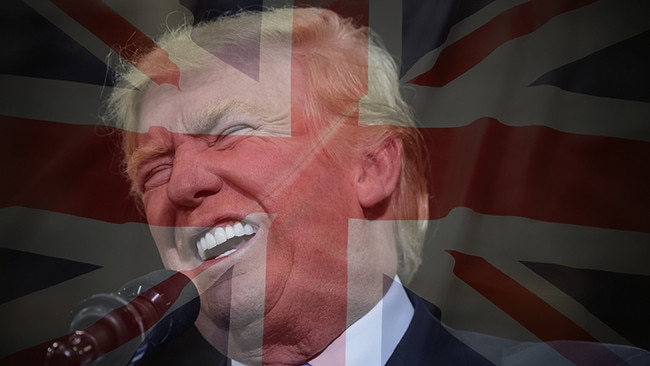Brexit, Trumpism are very different beasts
For all the apparent similarities, America has embarked on a more insular, mean-spirited course than Britain.

It is undeniable that the Brexit vote and Donald Trump’s victory both confounded expectations and the opinion pollsters. They also triggered sharp movements in currencies. In each case, an uprising of the white, poor and unfashionable was followed immediately by a cry of disbelief from young metropolitans. And, yes, there was — once again — a beaming Nigel Farage.
But please, please can we kill the lazy idea that our EU decision and the US election are otherwise equivalent? To persist in doing so might look suspiciously like an attempt by some Remainers to blacken a good cause by unfair association. More importantly the link diminishes the extent to which Mr Trump’s success should deeply trouble people on both sides of the Brexit debate.
Trump isn’t Brexit plus, plus, plus but Brexit minus, minus, minus. I shouldn’t need to list his bulldozings of moral norms. The Muslim ban. His suggestion that Mexican immigrants were mostly drug peddlers and rapists. His advocacy of torture as a weapon of foreign policy. Over many years we’ll wonder if his crudity and dishonesty helped him win or if he won in spite of it.
We cannot avoid now concluding that the hate that has been spreading throughout social media — much of it directly to the 13.9 million followers of Mr Trump’s Twitter account — has seeped into mainstream culture. Civilising norms established in face-to-face relationships now compete with those bred outside any conventional form of community. I don’t know how parents will explain how a man guilty of such wretched behaviour has been honoured with one of the most extraordinary mandates ever secured in an advanced democracy.
But 59 million voters have decided that Mr Trump will be the 45th president. Many were ready to overlook his flaws because they yearned to put an explosive outsider in charge of a system that produced the unpopular Iraq war, the 2008 crash, an uprising of racial violence in American cities, and a political paralysis in Washington that, they calculated, would not be solved by another Clinton.
The president-elect has the power to, as promised, take America out of the Paris climate trade accord, abolish ObamaCare, build that wall across the Mexican border and shut America’s borders to refugees and other “wretched refuse” of teeming shores. The Republican Party that feared wipeout instead holds more political power than ever before.
It is this, rather than the breakthrough of being the first African-American president, that will be Obama’s legacy. In eight years he has presided over the loss of an unprecedented number of Democrat-held state governorships and legislatures. At the federal level, he lost the House of Representatives, then the Senate, now the White House and soon, in all likelihood, the Supreme Court. His party and its causes are, you might say, at the very back of the line.
His “back of the queue” remarks about Brexit earlier in the year suggested that we would be punished if we left a supranational structure that no US president would ever countenance. Not such a special relationship then. The legislators who’ll run Washington from January, however, could hardly have more different views.
The likely Speaker of the House of Representatives, Paul Ryan, described (with apologies to the rest of the UK), “England” as America’s “indispensable ally” and called for a fast-tracking of a trade deal. The Senate leader, Mitch McConnell, likened the “unelected bureaucrats in Brussels” to a tiresome dictatorship and supports the idea of a “UK Trade Continuity Act”. Trump himself, weary of free trade deals with poorer, developing nations that might undercut blue-collar US wages, is enthusiastic about a deal with us. It’s almost certain we will be able to negotiate an economic treaty much more quickly than the EU’s 27 bickering nations.
A US-UK trade deal would be a small consolation if Mr Trump starts trade wars with the likes of China. We must hope that the seasoned people around him, although more conservative than European politicians, will ensure that sense prevails. People such as ex-mayor Rudy Giuliani, who transformed New York’s competitiveness and safety. The author of 1994’s Contract with America and its welfare revolution, Newt Gingrich. And Trump’s vice-president, Mike Pence, the regarded governor of Indiana. The US may have taken an unprecedented turn this week but the characteristics that made it the world’s most technologically advanced, most militarily powerful and richest nation are largely intact.
Boris Johnson underlined the differences between Trumpism and Brexit when he said that “the only reason I wouldn’t visit some parts of New York is the real risk of meeting Donald Trump”. But other than Nigel Farage’s inner circle, which has built close links with the Republican election machine and the Trump family, few politicians anywhere in the world are better connected to America’s new leaders than Liam Fox, Theresa May’s international trade secretary, and a tireless transatlantic bridge-builder.
After a tricky few weeks Brexit has received a significant boost in the world’s biggest superpower becoming a supporter. It’s a silver lining around the very thick and dark Trump cloud, but it’s not nothing. It would mean special access to an economy that at US$18 trillion is $4trillion bigger than the EU’s.
The Times









To join the conversation, please log in. Don't have an account? Register
Join the conversation, you are commenting as Logout